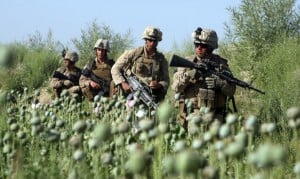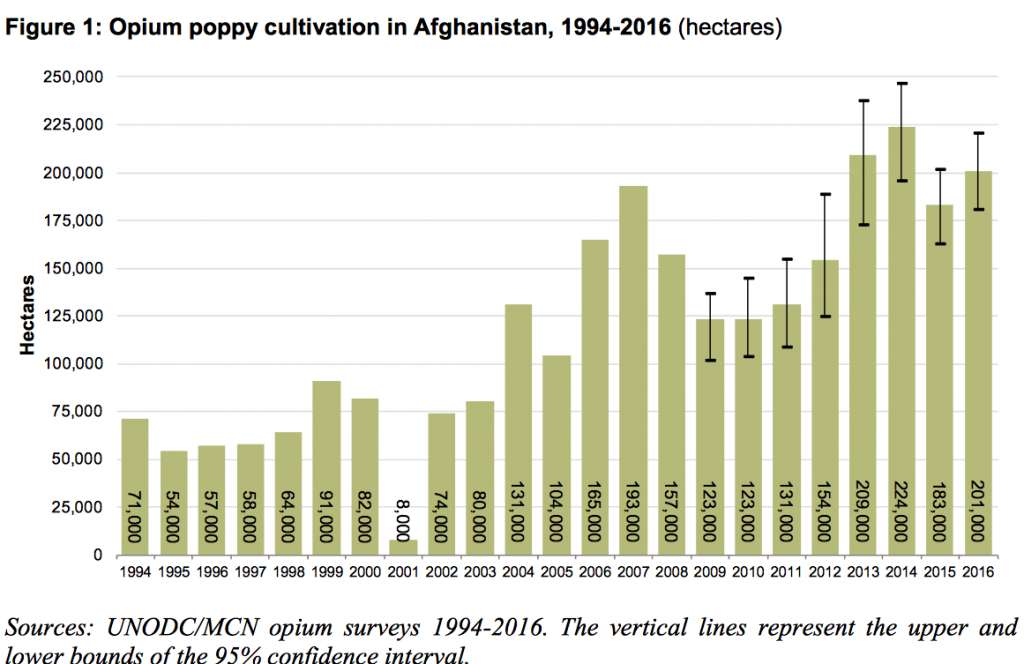Opium Capital of the World : Afghanistan
"Without drugs, this war would have been long over."
"The heroin is a very important driver of this war."
Afghan President Ashraf Ghani
"If an illiterate local Taliban commander in Helmand [Province[ makes a million dollars a month now, what does he gain in time of peace?"
Senior Afghan official
 |
| U.S. troops in a opium field, Afghanistan Global research |
Afghan forces destroyed an estimated 100 opium refining laboratories; crude affairs, but very effective for their purpose. That was the proverbial tip of the iceberg, given that there are between 400 and 500 such laboratories scattered in the hinterlands. "They can build a lab like this in one day", admitted General Abdul Khalil Bakhtiar, the country's deputy interior minister whose charge it is to see to the effectiveness of counter narcotics police.
It has been hugely profitable for years for the Taliban to tax and provide security to opium producers and smugglers. They see now far greater profits in becoming more directly involved in all stages of the drug business on their own, and they have become rivals to some of the region's major drug cartels. Driven by the riches to be gained, the Taliban -- the group identifying itself as' Islamic scholars' -- has joined the illicit, soul-destroying trade with a vengeance.
In 2016, Afghanistan's opium economy had a value of $3-billion, double the previous year's total, representing 16 percent of Afghanistan's gross domestic product, according to figures released by the United Nations. Increased processing on the part of the Taliban has resulted in their grasping a greater share of the $60-billion that identifies the global trade in Afghan opium.
Taliban refining operations in the country that produces a staggering 85 percent of the world's opium is reflected in empty barrels to be used to mix precursor chemicals in the production of opium, alongside piles of firewood, a press machine, a generator and water pump, comprising a typical opium processing operation.
This is a step forward in profitability for the Taliban which had for years smuggled bulky opium syrups out to be refined elsewhere. Now, an estimated half of Afghan opium is processed within Afghanistan into either morphine or heroin. And refining means the drug is easier to smuggle out, increasing profits, where the Taliban derive 60 percent of their income from the trade.
A small police unit, the National Interdiction Unit, comprised of some 450 to 600 commandos mentored by American Special Forces are responsible in attempting to control and disrupt the flow of Afghan drugs to regional and Western capitals. A senior counternarcotics official in Kabul informed that the elite unit followed a network of money launderers in an opium-rich province helping to import the needed chemicals to refine heroin.
When the officers collected sufficient evidence to sweep in for a high-level arrest they discovered that a police commander had stepped in to warn the suspect. The National Interdiction Unit stationed in a mountainside base saw its top commander recently replaced when he failed a polygraph test, and "was probably leaking information to hostile forces", according to a report by the U.S. Special Inspector General for Afghanistan Reconstruction.
Daily, laborers go into fields to destroy the poppies. Before they do, however, hidden Taliban bombs have to be decommissioned by de-mining teams. "It seemed easy ... but it was tough. It was almost a war there, every day" stated Javid Qaem, deputy minister of counternarcotics.

Labels: Afghanistan, Heroin, Opium, Taliban

<< Home